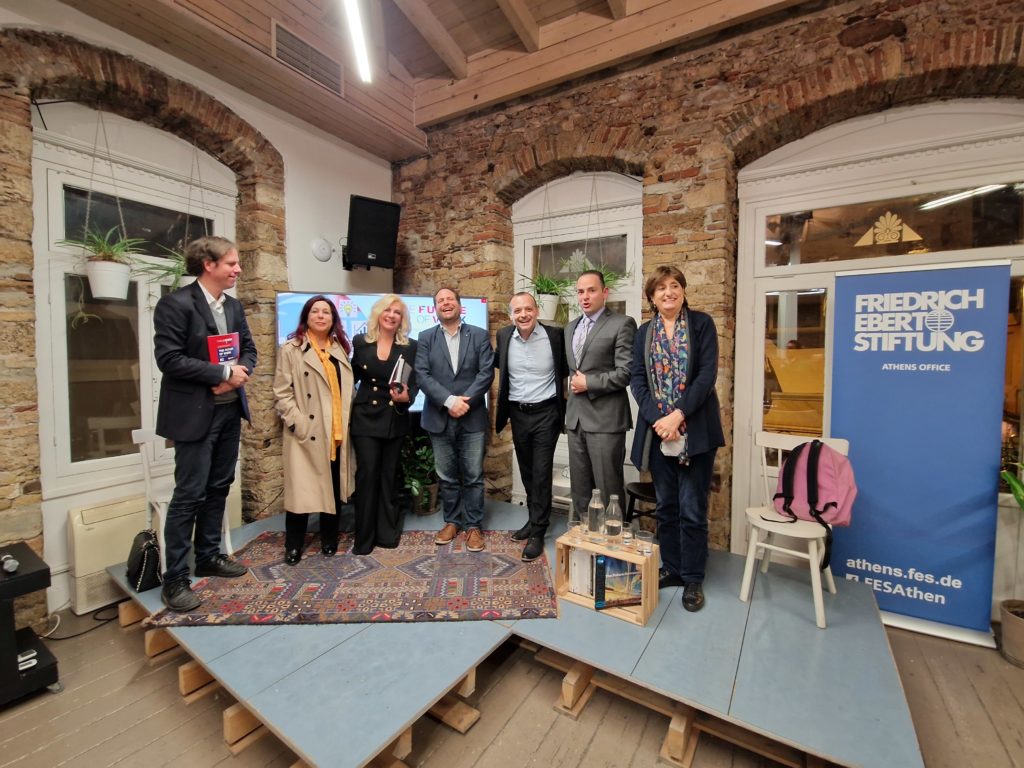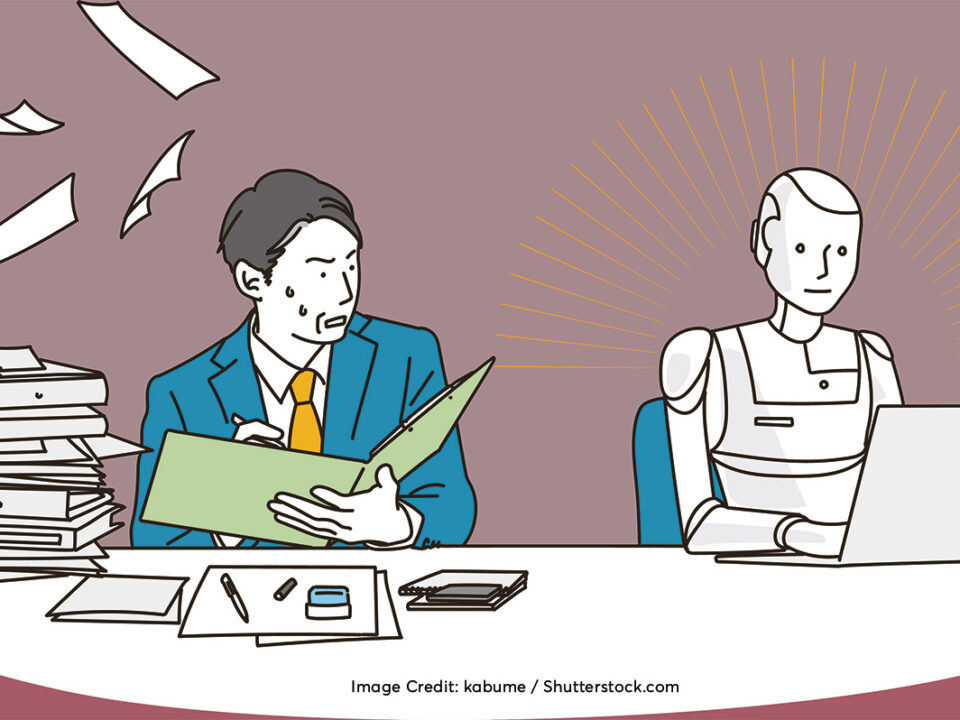Precarious employment, delignitisation and transition to care at the official presentation of the Future of Work project
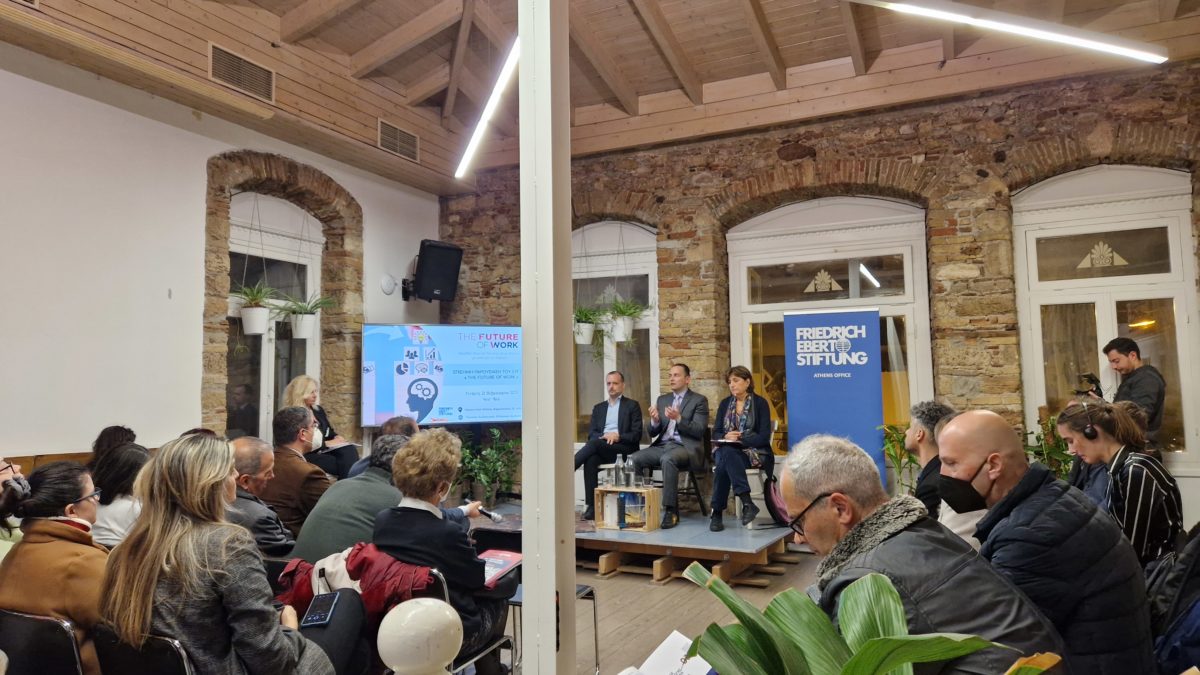
On Wednesday, 22nd of February 2023, took place the event for the official presentation of the “The Future of Work” project, the joint initiative of the Friedrich Ebert Stiftung (FES) – Athens and the Re-public think tank. The discussion was moderated by the journalist Valia Petouri, while opening greetings were addressed by Arne Schildberg, Director of FES Athens, and Dimitris Oikonomou, co-founder of Re-public. On the occasion of the project presentation, three different perspectives were heard on the stakes of work in Greece today.
The first speaker, Ilias Livanos, researcher at CEDEFOP, analysed the challenge of precarious employment in the period 2000-2018, with an obvious increase during the crisis period of 2008 and after. Specifically, according to Arne Kalleberg’s economic definition, precarious employment is the work that is uncertain, unpredictable, and dangerous. Examples of precarious work are found in employment contracts (involuntary part-time or temporary employment), anti-social working hours (long hours – weekend work), institutional framework (unpaid overtime), and employment conditions (inadequate pay). The highest percentages, in particular, are observed in employment during anti-social hours and on weekends.
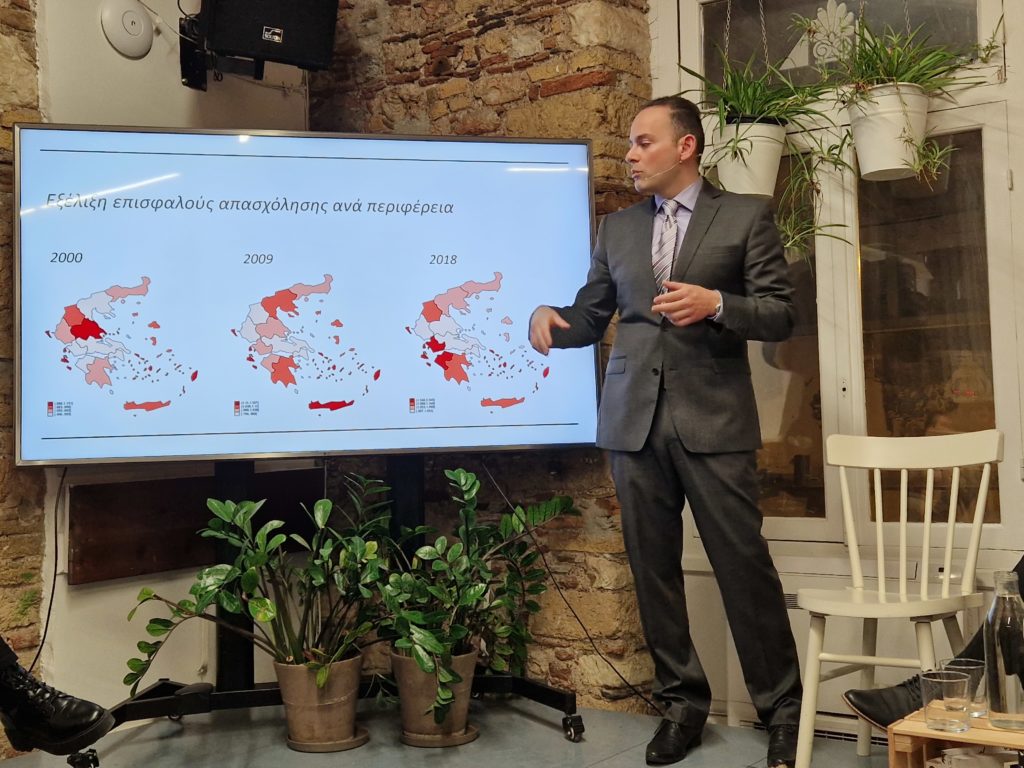
The precarious employment also varies depending on the geographical location, with the greatest precariousness being noted in 2018 in the touristic areas, such as the Ionian Islands the Cyclades islands and Crete. Based on the speaker’s conclusions, Greece is certainly at a much worse level than other countries, a fact that is based on the institutional framework, but also on a wider structural problem of the economy, while there is a large concentration of specific groups of workers such as the young, the non-natives and women.
The next speaker, Haris Doukas, Associate Professor at the National Technical University of Athens – Metsovio, focused on the burning issue of energy in Greece today, and especially on the energy transition of delignitisation – decarbonisation. It is a green transition plan that has been followed in recent years in Greece, from a fossil fuel economy to a zero emission society. For a country in which lignite has been the primary source of electricity for many years (58% in 2008), the risk of thousands of workers losing their jobs in this sector is present. Many lignite plants have already closed, and in Kozani alone 17,000 jobs have been lost. In Megalopolis, on the other hand, out of 25,000 workers in the sector approximately 750 are observed today, while the creation of lignite and natural gas factories in the vicinity is unprecedented.
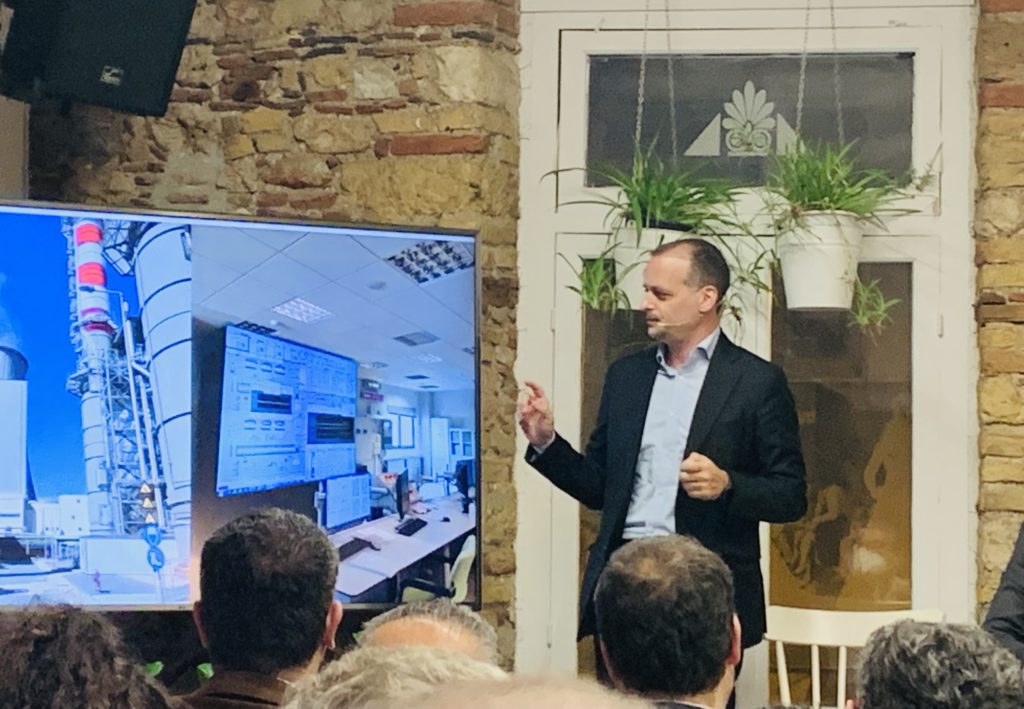
A question naturally arises as to the energy substitutes that can be exploited, and the risk of creating dependencies on non-public bodies is not small. Thus, according to H. Doukas, even though decarbonisation is the right way, the transition should be made at a gentler pace, with sure alternatives, but also with a mitigation of adverse effects. The speaker proposed channeling at least 15% of the energy produced to the municipality itself and the local communities, but also the generally greater participation of the residents of the critical areas in energy production and the benefits resulting from it.
Maria Stratigaki, Associate Professor at Panteion University and President of the Greek Association of Academic Women, took the floor, examining the socio-economic dimension of work in the context of gender and pointed out the need to introduce gender into the debate on the future of work . She distinguished the gender dimension of the labour issue at three levels: in the labour market, in work-family reconciliation, and at the broader level of society and the structure of the economy.
Regarding the first level, she noted that the reduction of the gender gap in the areas of finding employment, unemployment and wages, as well as hierarchical positions, is evident. However, women move more easily into “male-dominated” jobs, as they show greater occupational flexibility, even though “female-dominated” jobs were less affected during the crisis. In addition, today there is greater recognition of sexual harassment in the workplace, although the difficulty in both reporting and prosecuting them remains disappointingly high. The European Union, on the other hand, has for years recognised the economic benefit of gender equality at work, including it in its development goals. Despite these developments, the gender gap remains resilient, and there is no desire on the part of businesses to actually tackle the problem, but instead they only step in when anti-discrimination is in line with their commercial purposes.
Concerning the reconciliation of work and family, M. Stratigaki recognised their intense connection, especially during the period of the pandemic and the confinement of families, when teleworking increased on a pan-Hellenic level. The EU envisages reconciliation policies, such as the creation of daycare centers, but the question remains as to whom these policies should be addressed. Today, they are addressed almost exclusively to women, taking it for granted that the reconciliation of the two spaces is their responsibility.
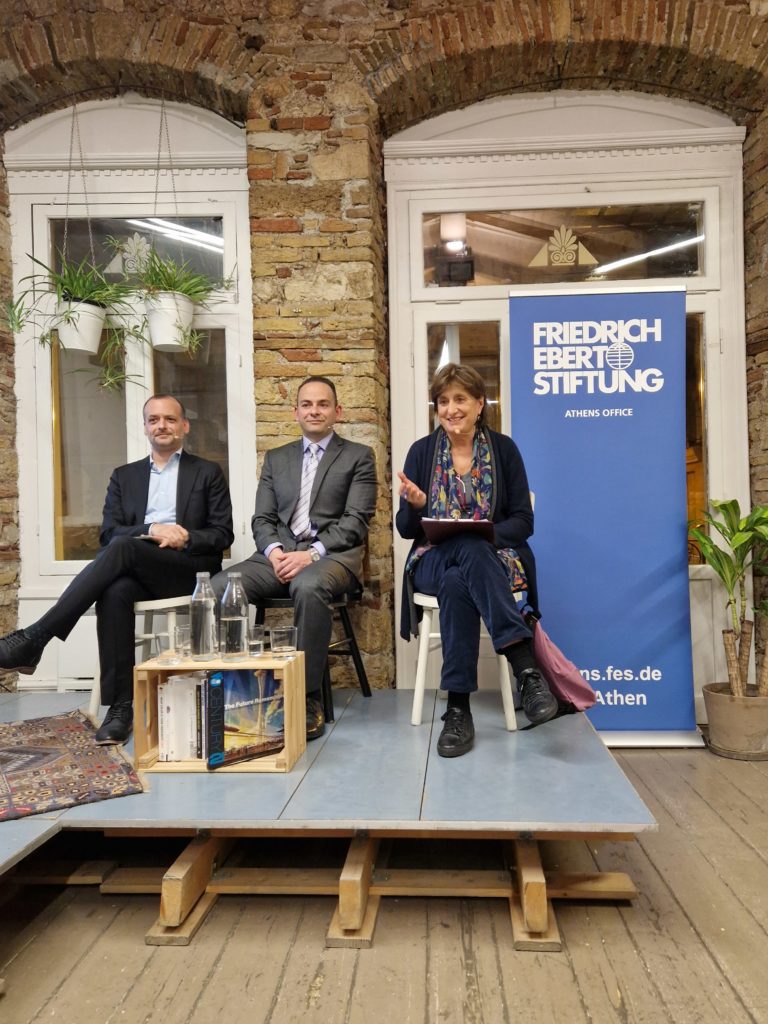
At the last more general level, the pandemic and teleworking have highlighted the important role of social and health care for economic development, when previously it was only seen as a “necessary evil” for vulnerable social groups. On top of this, in September 2022, the EU announced the “European Strategy for Care”, in an effort to secure the right to care and consolidate a care economy. In order to achieve this, it is necessary to anticipate the so-called “Transition to Care”, in order to reformulate working conditions, and to ensure equality between the two sexes.
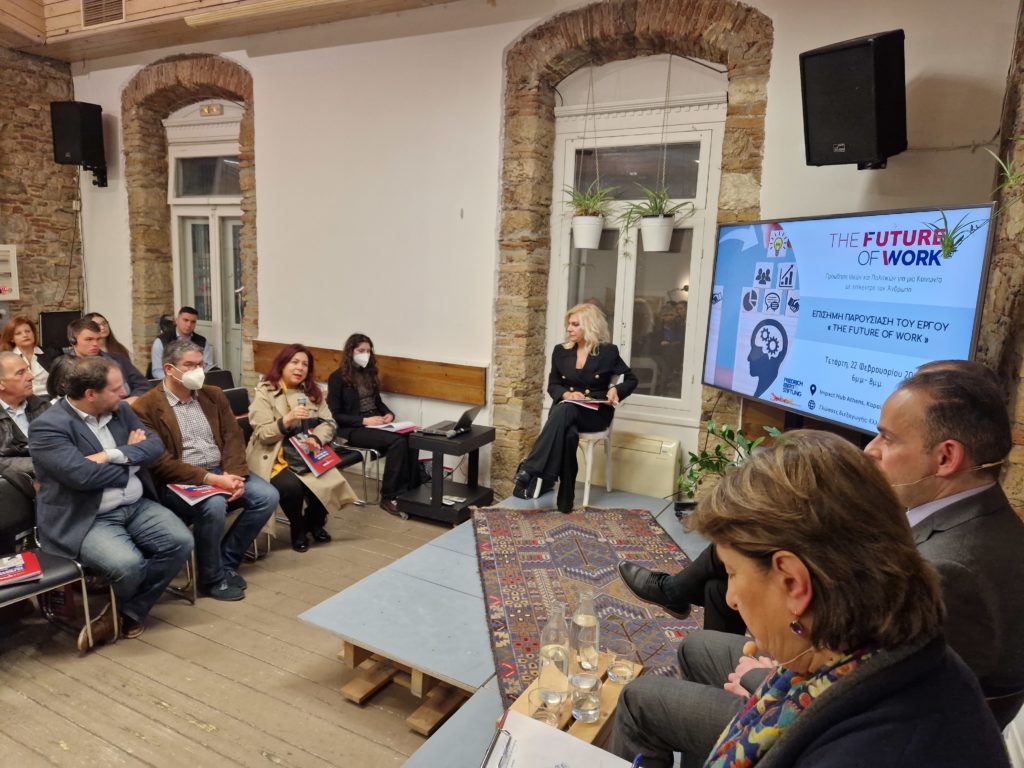
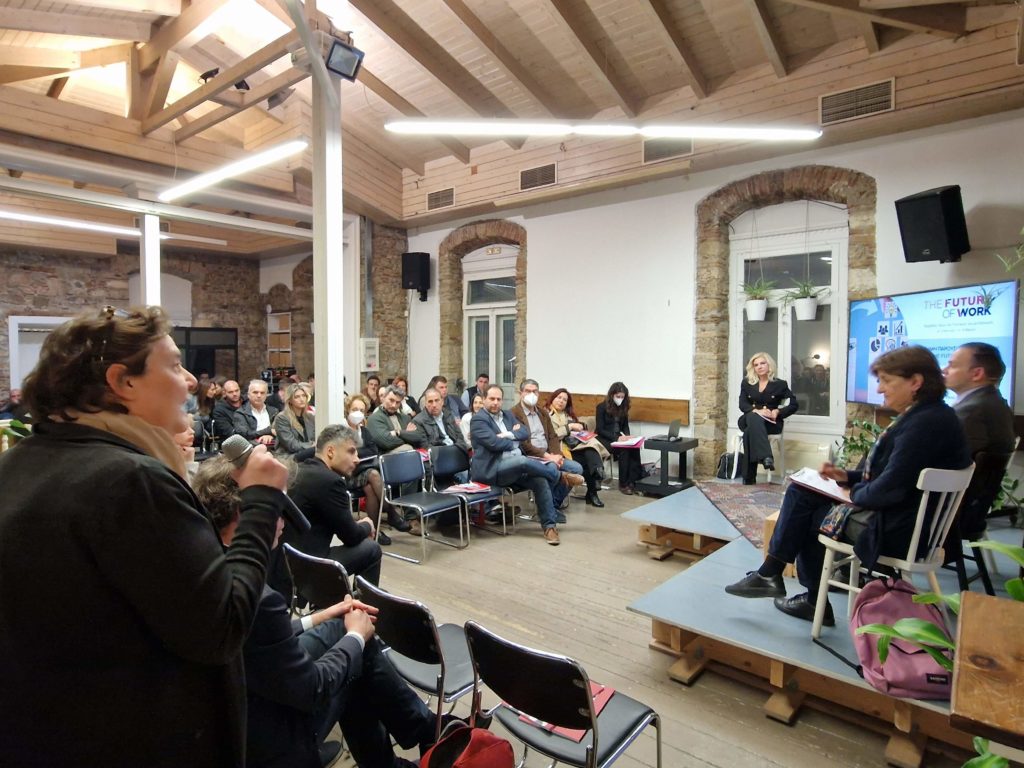
The “The Future of Work” project is a platform for the exchange of good practices, dialogue and promotion of progressive policy proposals from a wide range of Greek and international experts, with the aim of managing the challenges and exploiting the opportunities brought about by the 4th industrial revolution in the field of work. The innovation of the project lies in its holistic approach, taking into account not only economic but also social factors in Greece and the European Union.
The high level of the speakers’ panel, the interventions from the audience and the hard work of the Future of Work team have made this event a great success and laid the foundations for this project to contribute to the achievement of the aforementioned targets.
